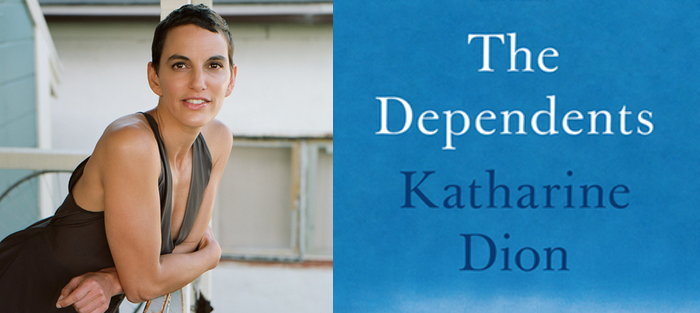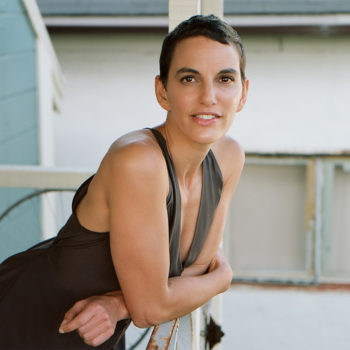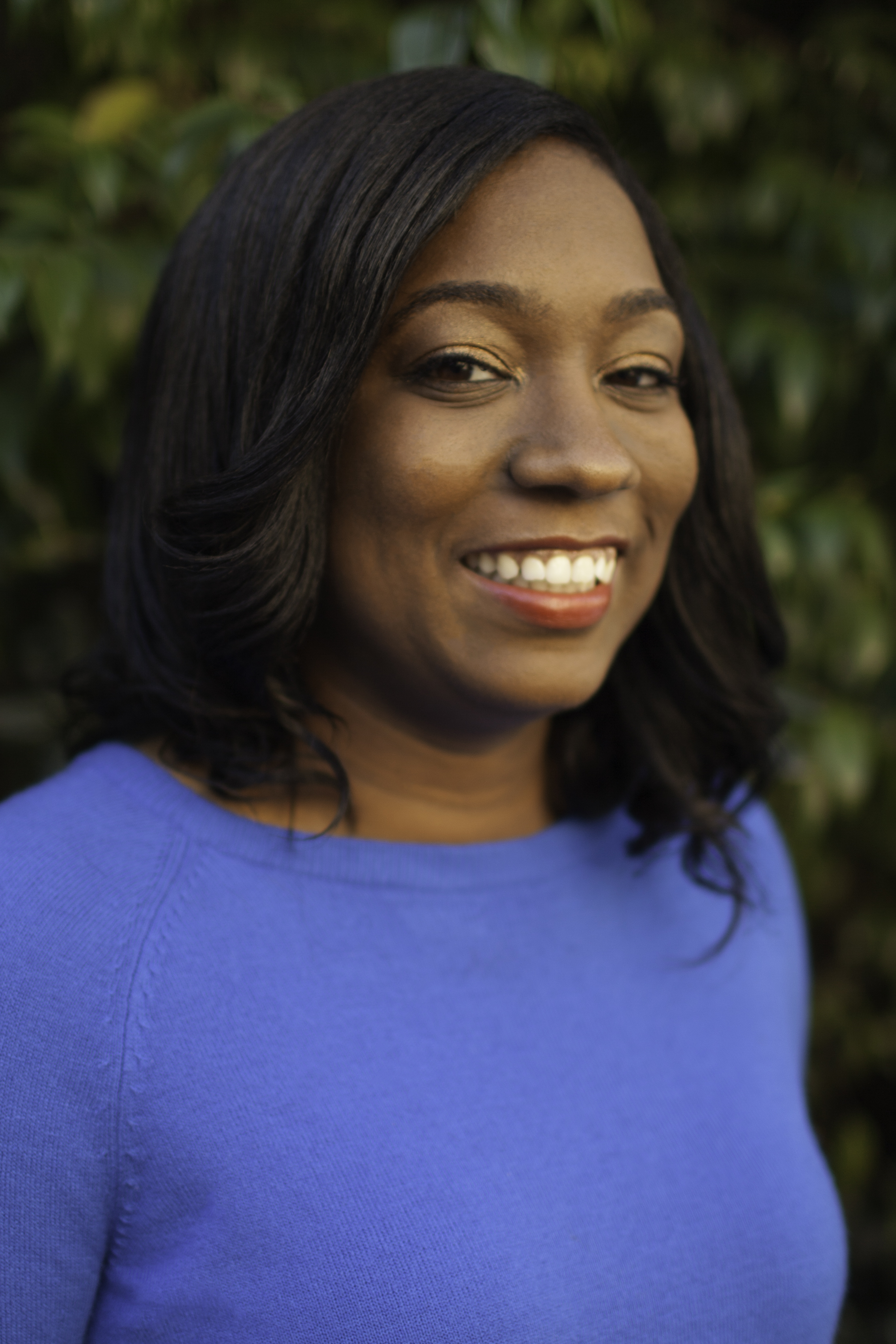Katharine Dion’s debut novel, The Dependents (Little, Brown and Company), explores the inner world of Gene, an elderly man who is interrogating his relationship with two women: his recently deceased wife, and his difficult daughter. Does he really know either of these women? We can say that this is a book about the impossibility of knowing those we love, but it is also about the consolations we find in spite of, and within, these gaps in our knowledge. It is a wise book, full of mystery and lyricism, the light and the dark.
A graduate of the Iowa Writers’ Workshop, Katharine Dion has been awarded an Iowa Arts Fellowship, a MacDowell Fellowship, and a grant from the Elizabeth George Foundation. She lives in Berkeley. Since we met a decade ago, I’ve watched Katy’s remarkable novel evolve over the course of many years. Our interview took place over Skype.
Interview:
Alice Miller: This is a brave book in that it dares to embrace earnestness. It never feels overwritten, but unlike a lot of contemporary fiction, it’s unafraid of overwriting. I’m interested in whether this was a conscious thing for you, and whether there were moments when this was terrifying.
Katharine Dion: That is such a good question. The choice of sincerity was deliberate, and part of that just had to do with who I gravitated towards, whose point of view I wanted to write from as the characters were emerging in the novel. There was certainly a moment where it occurred to me to write the book from different points of view. The point of view of Dary, for instance—the daughter in the book—or the point of view of someone who was a little more removed from Maida’s death than her husband Gene.
But I think part of what interested me in Gene as a character was his sincerity. In part, because it made him incredibly vulnerable and tender. I think that irony can be really useful to point out the gap between the way we think our lives look and the way they really look. I think it can be excellent at slaying illusions, but it often doesn’t put anything in the place of the illusions that it’s trying to slay.
I thought that it would actually be more difficult to write this book from a place of total sincerity, and that it would also be more destructive to the characters. I think that irony is a way often of protecting oneself from what’s actually happening. What interested me about Gene and what made the stakes of his emotional life feel more dangerous to me was exactly his sincerity, his earnestness, and his inability to calibrate it in a world that really punishes people for sincerity.
Gene is an extraordinary character. Can you talk a little more about how you stumbled upon him?
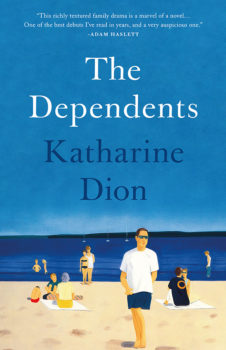 In the early stages of the book, when I was really starting to form him as a character, I was also taking a Shakespeare class. Actually, I was sneaking into a Shakespeare class that was for undergraduates but I was attending every week. It was taught by the poet Robert Hass, who I think we both admire as a teacher having both worked with him before.
In the early stages of the book, when I was really starting to form him as a character, I was also taking a Shakespeare class. Actually, I was sneaking into a Shakespeare class that was for undergraduates but I was attending every week. It was taught by the poet Robert Hass, who I think we both admire as a teacher having both worked with him before.
That was my first time reading King Lear. Somehow I had managed to get through high school and college without ever reading King Lear. And that play made a really profound impression on me. One of the things that interested me was the fact that what sets the drama in motion is essentially Lear’s exorbitant love for his daughter, and that love causes him to banish her and it ultimately makes his entire world fall apart. And yet, as a reader, I really never actually doubted the tenderness that he had towards his daughter, even though the form it took entirely blinded him to his own actions and to the consequences of his actions.
I was reading Harold Bloom’s criticism of the play at the same time, and Bloom sort of gave me a language for thinking about Gene as a character. And one of the things that he says about Lear is that his rashness at its most destructive remains a wholeheartedness, and that Lear seems to have no defenses against his own pathos.
I feel like a lot of the stories that I encounter are not necessarily about too much love, they’re about maybe not enough love or the way that difference or otherness prevents people from connecting. This is clearly a part of The Dependents as well, but there is also this idea that it’s not a wholly beneficial emotion either to oneself or to other people. And yet it’s probably one of the strongest inner desires that we come into this world with. We desire to be loved. We desire to be taken care of, we desire to be attended to. I was drawn to writing about this most basic need without trying to disguise it in a fancy or complicated way.
It’s a book about love, as well as about identity and roles. Gene is vulnerable and loving, and he also exhibits the rigidity of so many men of that generation. It’s really interesting this connection to Lear, this connection to what love can become or can make people do. Do you think you know what the book wants to say about love?
One thing I was interested in portraying was that the most intimate relationships of our lives can be with people who we still don’t have a definitive knowledge of, and that part of intimacy is the deepest mystery and that deepest mystery often requires close connection. Gene and Maida had years and years of life spent together and that is actually a requirement for dwelling in such close proximity with this fundamental uncertainty about what can be expressed between two people about one’s innermost self and innermost life. I don’t know if the book says that, but certainly I felt that that was the territory it was crossing through.
It definitely shows this. You wanted to say something about overwriting before; do you want to return to that?
Yes. I think part of the way that Gene’s internal language was formed was directly related to the kind of reading that I fell in love with as a young adult and even as a young writer. The novels of Henry James, Middlemarch, I think especially Mrs. Dalloway and To The Lighthouse—all of those novels are pretty maximalist in terms of the way that they portray consciousness and being not only unafraid of adding dependent clause to a dependent clause to a dependent clause, but also insisting upon it as one of the true forms of mapping the way that our minds move. Not at all in succinct linear logical snippets, but more like something sticky that attracts debris.
For me, there’s still something incredibly powerful about that kind of writing and the rule-breaking and fearlessness it shows. Those writers were being true not just to some inner artistic vision they had, but to the nature of the characters’ minds that they were writing about.
In some way, I didn’t feel like it was a choice. Gene did not have an exceptional education. He was not particularly agile in the everyday conversations of his life. He constantly missed opportunities for developing a more nuanced self-awareness. And yet he found at times immense pleasure in the workings of his own mind.
There is a lot of richness in his internal world, even if he isn’t capable of transmitting it externally, and I think that is really the human condition. I think that no matter how expressive we manage to be with language, we are only able to describe a tiny fraction of our internal experience and we’re only conscious of a tiny fraction of our internal experience.
I was interested in depicting Gene’s internal life with a dignity and a fullness without feeding him a language that didn’t actually chime with the experiences he’d had. This was a challenge throughout the book. Paring back was a very important part of getting to the place where the prose ended up.
This paring back is beautifully done. You write these lyrical sentences which operate like musical phrases, and you naturally alternate between long phrases and brief sentences. The prose itself is compelling and beautiful—not unlike poetry—but what’s even more remarkable is that you manage to make this lyricism work believably from within Gene’s limited perspective.
It’s a book about limitations, isn’t it? The limitations of one’s inner life and one’s relationship and of a life itself. And these heartbreaking, moving limitations are also very much apparent in your prose, in how much it dares to do.
I want to go back to talking about influences. I was thinking about George Eliot, whom we both love. One thing this book has in common with her work and also in common with Tolstoy (who himself has a small role in The Dependents) is that when I go back and re-read these writers, I’m always surprised to rediscover how funny they are.
And it’s the same with The Dependents. It’s a very serious book, about grief and death and the end of life and how little we can possibly know the people that we love and even ourselves. In many ways, this should be a crushing book, but it has a great deal of lightness. There’s humor and a lot of play. And the book moves like grief, shifting between light and dark. How much did you think about humor and playfulness in the work?
I will say that I didn’t feel that I had much control over the humor, but I do think the writers that you pull up as examples were very powerful for me, particularly in the kind of humor that they are so adept at depicting. And I find that there is often something quite humorous in the situation in which a person says something but does the completely opposite. There’s some built-in humor to that which isn’t necessarily bleak.
I’m thinking of a tiny little moment from Tolstoy; every time I read it, it makes me laugh. I don’t even remember the larger scene in which it’s happening, but there’s a point where Oblonsky runs into Levin. Levin invites him into his house and Oblonsky says, “No, no, I have no time at all. I’ll just stay for a minute.” And then Tolstoy goes on to write that Oblonsky takes off his coat and sits down and proceeds to talk for the next hour about many different and serious subjects of life.
It’s such a wonderful snapshot of the way that we say one thing and do another—and there’s such lightness, in part because it shows that (a) we are not in charge of ourselves in the way that we often wish to think we are and that (b) so much of the spontaneous, unpredictable and interesting things that happen in our lives are because we stumble into them.
Yes. I also wanted to note that even though this is a book from the perspective of an elderly man, it’s also a book that reflects a great deal on the role of women. And I wanted to know whether this was something that you were particularly interested in interrogating.
I’m so glad that you brought this up. I think that the book looks at the role of women in a rather subtle way; it would be possible to read, enjoy, and understand the book without necessarily engaging with that part of it. But it was very important to me and so I’m glad you noticed.
I was interested more generally in how the identity of a dead person is formed and manipulated and altered and broken down and created again by the circle of mourners around him or her. But I also had a particular interest in the way women are remembered and praised, whether that’s when they’re living or once they’ve passed away.
I think that the experience of motherhood is so powerful and central to many women, personally and also to the other people in their inner circle. And not just motherhood, but an attitude of caring for other people. As much as we have moved away from an earlier time where women were only expected to be mothers, there’s a reification of that role that continues.
I was interested in looking at what happens when that is complicated, when someone maybe is an excellent mother but also had an internal life in which she wasn’t mostly invested in taking care of other people and maybe resisted it and rebelled against it in ways both internal and external. I was investigating those questions in the novel as I thought about Maida—Gene’s deceased wife—and the way her posthumous identity is formed in the novel.
This also carried through to Dary, Gene and Maida’s daughter, who is of a very different generation, one of the early generations of women to go to an elite college. She has a different sense of herself in the world, and what that means for her choices around reproduction, and also the way she relates to this older generation of men who have a set of values that she finds outdated. I was interested in exploring the reasons why someone like Dary might feel unapologetic about having chosen to have a child without a man and not feel that she needed to explain or justify that to her father, because to do that would be validating his view as the normative view. I think there are even more places where this issue comes up in the novel but those are a few things that I was certainly interested in exploring.
Could you talk a little bit about how your experience as a student influenced your writing practice, or if there are particular moments in your formal education that come back to you when you’re writing?
I feel like probably the most important part of my formal education or the part that is most important to my writing is what you touched upon, which is the musicality of language. I have almost no memory of the novels that I read in high school or college.
It just turns out that the way my memory works is that it really doesn’t attach to story very much at all. What it does attach to is image and mood and the particular music of language. I did spend most of the later part of my high school education and almost all of college studying poetry, and I had no good reason for that at the time and in fact I found it quite baffling. I had no idea what I was going to do studying poetry; I didn’t think I wanted to write poetry.
Part of the reason I admire poems and poetry so much is because they seem to have already jumped out of a logical narrative way of explaining experience. They’ve jumped out a little more quickly than a lot of stories and novels can.
I think the most wonderful stories and novels do jump out of that framework and do it immensely successfully, but a poem often starts from there. It starts from a place of instability. Whenever I sit down to read a poem, there’s always the sense that it could go anywhere. There’s nothing to determine where it needs to go in the first line or the second line or the third line. Having never written a poem, I’m sure that the experience of writing poetry is actually quite different, and that for the poet there is an internal logic and rhythm that is there often right from the start. For me, as a reader, poetry has been a wellspring for my imagination and I think it’s what trained my ear as a writer.
That’s wonderful. Are there particular poets you were reading while you wrote this book or that you came back to?
It’s funny. I was reading a lot of poetry and I was reading really widely. I was reading a lot of Jorie Graham. I was reading a lot of Rilke. Then later in the novel I was reading a lot of Jack Gilbert.
I was trying to write a book that wasn’t fundamentally about thinking, but about feeling. Gilbert was this wonderful teacher whose work continually said: “a feeling is good enough, there is nothing more that you have to prove.” You can write about a feeling in itself, and it can be the most illuminating experience of life. You don’t have to try to overlay it with analysis or interpretation. It’s actually the most difficult thing of all—to get close to the feelings.
I know that you might not want to talk about this, but I’m very curious whether you can tell us anything about what you are working on now. Now that you’ve come to the end of the long journey of this book, are there different worlds you’re curious to explore, or similar worlds that you’re curious to carry on with in your next work?
I do think that in some ways my next book—which is only in its very, very incipient stages—will be a response to the last book in the sense that it took me eight years to write The Dependents. That was a very long time to be embedded in a particular mind and a particular world, a particular prosody and also a particular mood.
The Dependents excavates the landscape of grief which, as you’ve noted, is not just one of sorrow, but one of joy and humor and consternation and levity and curiosity. But at the same time, there were parts of writing the book that were quite emotionally difficult for me. I don’t think that I can avoid emotional difficulty or that I would want to—I think going through that emotional difficulty oneself is part of what gives a satisfying experience to the reader. I do think that I probably won’t write a book that dwells in the same territory. I am certainly formally interested in a different way of thinking through language. I imagine that will show up in a different kind of sentence and different kinds of points of views and that the actual geographical territory of the novel will be quite different as well. I think it’s a little early for me to say much more.
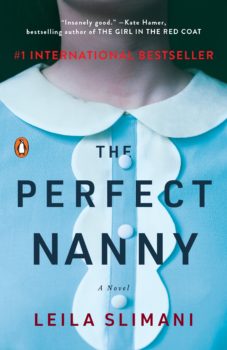 One thing I will try to retain is this fidelity to the characters’ inner world. I just heard Leila Slimani give a really compelling talk about her book, The Perfect Nanny. She told the audience that she wasn’t at all interested in what the characters were thinking or feeling inside, she was really only interested in how they acted and the volumes that those actions spoke about their internal states. I admired her clarity on that issue, that she was able to say that.
One thing I will try to retain is this fidelity to the characters’ inner world. I just heard Leila Slimani give a really compelling talk about her book, The Perfect Nanny. She told the audience that she wasn’t at all interested in what the characters were thinking or feeling inside, she was really only interested in how they acted and the volumes that those actions spoke about their internal states. I admired her clarity on that issue, that she was able to say that.
But in my own work, I guess what I’ve learned is that if I do an attentive and faithful job of tracking those internal states—even when it doesn’t obviously tell me how it advances the story—it actually tells me a tremendous amount about where the story is headed and what might happen to these characters. It doesn’t mean that all of that has to end up in a final version of the book, but I think that this will continue to be an important part of how I write about people who are not me in an authentic way.
To finish, I know you often have things pinned above your desk. It was a long process to get through this very accomplished book, and I thought you might share with us some of the guides that came with you along the way.
Well, yes, there are many things on the wall of my studio. There’s a beautiful letterpress print of Jorie Graham’s poem “Salmon”; that’s actually right in front of my desk. I have a sheet of paper where I wrote down some sentence aspirations for myself. I also have a blackboard where I’ve chalked a number of words that interest me because of their sound or meaning. I just like to have a visual expanse of words in front of me. They’re common words; they’re not necessarily anything special.
What are some of the words?
Well—misshapen, tacit, unsubstantial, inconclusive, sporadic. Those are some of them. I wrote out a copy of Stevens’ poem, “The House was Quiet and The World was Calm.” There’s just a very poorly scribbled version of that poem on my wall. I also have notes from Richard Diebenkorn, who’s a visual artist. His notes to himself on beginning a painting, I’ve typed out. There are ten notes. Number one is “Attempt what is not certain. Certainty may or may not come later. It may then be a valuable delusion.” I think that’s fabulous. Number nine is “Tolerate chaos,” which is very good for any novelist seven years into a novel.
That’s a good rule for life.
Exactly. Then there are a couple of wall hangings that relate to my Buddhist practice. One of them is a piece of art that a friend made. It’s a cardboard replica of a wooden drum that is hit every morning and every evening at the Zen monastery where I’ve spent some time. On the face of the drum is what I think is one of the most simple, compelling poems that I’ve come across. The lines are:
Wake up
life is transient
swiftly passing
be aware
the great matter
don’t waste time.
When you hear this wooden drum in the temple, it’s a really loud crack. It’s a drum that might wake you up in the morning if you are still sleeping. If you actually get to play the drum, it cracks through your whole body. It’s ear-splitting. It’s calling you. The moment you hear that drum there is nothing to do but to hear the sound of the drum and it’s saying, “Wake up! Life is transient.”

